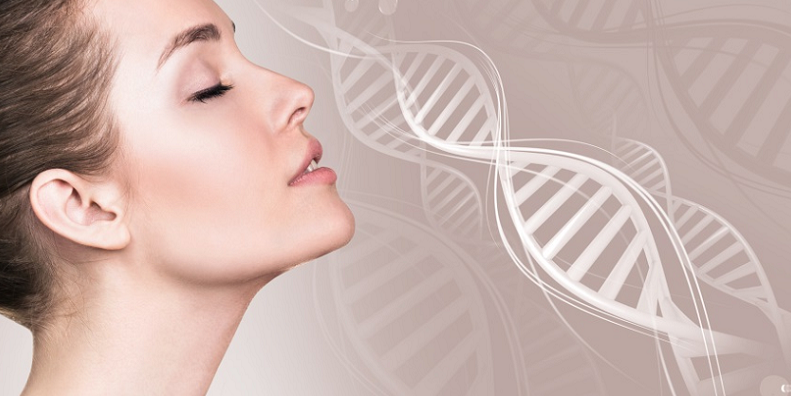
Epigenetics, a field that explores how our environment and behaviors can influence the way our genes work, is shedding new light on how we can care for our largest organ – the skin. From the creams we apply to the air we breathe, various factors are constantly interacting with our skin at a molecular level, influencing its health, appearance, and aging process. Here we examine the basic principles of epigenetics and how they relate to skin biology, and explore the innovative epigenetic skincare solutions that are tailoring beauty regimes to our unique genetic makeup, offering a more personalized approach to skincare than ever before.
Contents
Introduction to Epigenetics
In this era of scientific advancements, understanding the intricate relationship between our genetics and external factors is more crucial than ever. Epigenetics is a field that marries the complexities of genetic expression with the art of skin maintenance.
Definition of Epigenetics
Epigenetics refers to the study of changes in organisms caused by modification of gene expression rather than alteration of the genetic code itself. It’s about how your genes interact with your environment. This branch of science has gained significant attention in recent years for its potential to explain how our lifestyle, environment, and even thoughts can impact our genetic activity, which, in turn, influences our overall health and wellbeing.
Overview of Skincare Evolution
The journey of skincare has been long and ever-evolving. From ancient herbal remedies to modern-day scientific formulations, the quest for perfect skin has been a constant in human history. However, the advent of epigenetics in the realm of skincare is a leap forward. It represents a shift from a one-size-fits-all approach to a more personalized methodology, acknowledging that our unique genetic makeup plays a significant role in how our skin behaves and responds to different treatments and environments.
Importance of Epigenetics in Modern Skincare
In modern skincare, understanding the role of epigenetics is crucial. It opens up new possibilities for customized skincare solutions that can adapt to the specific needs of an individual’s skin. By focusing on how genes express themselves under various conditions, researchers and skincare professionals are developing products and treatments that are not just skin-deep, but rather tailored to the genetic profiles and lifestyles of individuals. This approach marks a significant shift in how we perceive and care for our skin, leading us towards a future where skincare is not only about addressing issues on the surface but nurturing the skin at a molecular level [1].
Understanding Epigenetics
Epigenetics, a term coined in the early 20th century, has become a key concept in modern biology and, intriguingly, in skincare. This segment aims to demystify epigenetics and explain its relevance in the context of skin health and beauty. Understanding the foundations of epigenetic science is crucial for comprehending how it influences our skin and the development of skincare products.
Basic Principles of Epigenetics
Epigenetics, at its core, studies the biological mechanisms that switch genes on and off. While our DNA sequence remains the same throughout our lives, epigenetic factors can change the way our genes are expressed. These changes are influenced by various factors, including lifestyle, environment, and even our psychological state. In skincare, this means that while we might inherit certain skin traits genetically, epigenetic factors can significantly alter how these traits manifest.
How Epigenetic Changes Occur
Epigenetic changes primarily occur through processes such as DNA methylation, histone modification, and RNA-associated silencing. DNA methylation involves adding a methyl group to DNA, which can change the activity of a DNA segment without changing the sequence. Histone modification refers to changes in the proteins that DNA wraps around, affecting gene expression. RNA-associated silencing involves RNA molecules that can turn off gene expression. These processes demonstrate that our genes are not our destiny; rather, they are dynamic and responsive to the environment [2].
Examples of Epigenetic Mechanisms
To illustrate epigenetics in action, consider the impact of sun exposure on the skin. Ultraviolet (UV) rays can cause epigenetic changes that lead to increased skin aging or pigmentation changes. Similarly, lifestyle factors like diet, stress, and sleep patterns can induce epigenetic modifications that influence skin health. This understanding opens up new avenues in skincare, where products and treatments can be designed to target these epigenetic changes, offering more effective and personalized skin care solutions.

Epigenetics and Skin Health
The intersection of epigenetics and skin health is a burgeoning area of research, revealing how our genes and environment interact to shape the health and appearance of our skin.
The Role of Epigenetics in Skin Biology
Skin, as the largest organ of the body, is constantly exposed to various external and internal factors that can influence its health. Epigenetics plays a vital role in how skin cells respond to these influences. It affects crucial skin functions such as cell turnover, collagen production, and pigmentation.
For instance, epigenetic mechanisms can dictate how quickly skin cells regenerate, which has implications for aging and wound healing. Understanding these processes is key to developing skincare products and treatments that can effectively target these underlying mechanisms, leading to healthier, more resilient skin [3].
Impact of Environmental Factors on Skin Epigenetics
Environmental factors such as UV radiation, pollution, diet, and stress can cause significant epigenetic changes in skin cells. Prolonged sun exposure, for instance, can lead to DNA methylation changes that accelerate skin aging. Pollution can alter histone modification, influencing skin sensitivity and the likelihood of developing skin conditions like eczema or psoriasis. By understanding these epigenetic impacts, we can better prevent and treat skin issues arising from environmental exposures.
Case Studies: Epigenetic Influences on Skin Conditions
Several case studies highlight the impact of epigenetics on skin health. Research has shown that certain epigenetic modifications are associated with common skin conditions like acne, rosacea, and skin cancers. These modifications can influence how severe these conditions are, how they respond to treatment, and even the likelihood of their occurrence based on individual genetic predispositions and lifestyle factors. These insights are crucial for developing targeted therapies that address not just the symptoms but the epigenetic roots of these conditions.

Epigenetic Skincare Solutions
The integration of epigenetic insights into skincare has led to the development of innovative solutions tailored to address the complex needs of the skin at a molecular level.
Development of Epigenetic Skincare Products
The rise of epigenetic skincare has marked a new era in the beauty and wellness industry. These products are formulated based on the understanding that certain ingredients can influence gene expression to improve skin health. For instance, advanced serums and creams are being developed to target specific epigenetic markers associated with aging, hydration, and pigmentation. These products aim to modify the way skin cells read and execute genetic instructions, thereby improving skin quality and appearance from within.
Ingredients That Influence Skin Epigenetics
Key ingredients in epigenetic skincare include peptides, antioxidants, and plant extracts. Peptides, for example, can signal skin cells to increase collagen production, impacting epigenetic markers related to aging. Antioxidants like Vitamin C and E can protect skin cells from oxidative stress, thereby influencing gene expression related to skin resilience [4].
Plant extracts, such as green tea and soy, contain compounds that can modify epigenetic marks, affecting processes like pigmentation and inflammation. The careful selection and combination of these ingredients are what make epigenetic skincare products particularly effective and innovative.
Benefits of Epigenetic Skincare
The benefits of using epigenetic skincare solutions are multifaceted. Firstly, these products offer a more personalized approach to skincare, targeting specific concerns based on individual genetic predispositions and environmental interactions. This results in more effective and sustainable skin health improvements. Additionally, by focusing on the root causes of skin issues at the genetic level, epigenetic skincare can provide long-term benefits, slowing down the aging process, improving skin resilience, and enhancing overall skin appearance.
Personalizing Skincare Through Epigenetics
In an era where personalization is key, epigenetics is paving the way for bespoke skincare solutions.
Customized Skincare Based on Epigenetic Testing
Epigenetic testing in skincare involves analyzing an individual’s genetic markers to understand specific skin needs and predispositions. This cutting-edge approach allows skincare professionals to tailor products and treatments to the unique genetic profile of each individual. For instance, someone with a genetic predisposition to dry skin might benefit from products that enhance gene expression related to moisture retention. This level of customization goes beyond the traditional skin type categorizations, offering a more precise and effective approach to skincare.
The Future of Personalized Skincare Solutions
The future of personalized skincare lies in leveraging epigenetic insights to develop highly individualized skincare routines. This could mean products that are specifically formulated based on a person’s epigenetic data, taking into account factors like environmental exposure, lifestyle, and even stress levels [5].
This approach not only enhances the effectiveness of skincare products but also minimizes the trial-and-error process often associated with finding the right skincare regimen. It represents a shift from reactive to proactive skincare, focusing on prevention and maintenance tailored to each individual’s genetic makeup.
Ethical Considerations and Challenges
While the potential of personalized epigenetic skincare is immense, it also brings forth ethical considerations and challenges. Privacy concerns regarding genetic data, the accessibility of such advanced skincare solutions, and the potential for misinformation are significant issues that need to be addressed. Moreover, the industry must ensure that these innovations are backed by solid scientific research and are made available in a way that is equitable and beneficial for all consumers, regardless of their background.
Personalizing skincare through epigenetics is not just a trend; it’s a scientific advancement that has the potential to transform the way we approach skin health. As we move forward, the balance between innovation, ethical responsibility, and consumer education will be key in realizing the full potential of this exciting field.
References
[1] https://lyma.life/journal/skincare-that-talk-to-dna/
[2] How the science of epigenetics is revolutionising skin care
[3] Epigenetic Regulation of Skin Cells in Natural Aging and Premature Aging Diseases
[4] What is epigenetics (and how it influences skin aging)
[5] The comprehensive assessment of epigenetics changes during skin development
